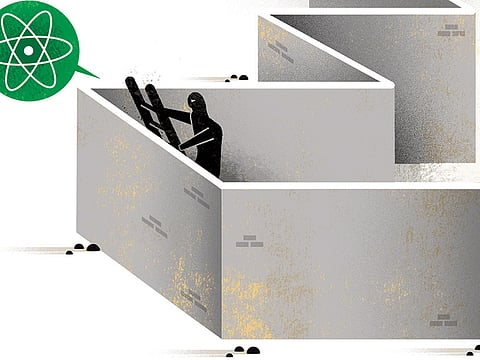Left remains Khamenei’s challenge
Iran’s most popular politicians take a dim view of the nuclear programme and point instead to its staggering costs

This winter, Tehran has been a place of conferences and complaints. Iranian President Hassan Rouhani last Sunday addressed a conference on the economy and bemoaned that “the economy cannot develop in isolation from the rest of the world.” Rouhani is not the first president of the Islamic Republic to grumble about the obstructionism of the parliament and the unelected branches of the government such as the judiciary and the security services.
Rouhani senses that economic growth is contingent on an arms control agreement with the great powers, but he still remains very much a man of the system. “In our general policies, all of us must follow the guidelines of the supreme leader,” Rouhani emphasised. While he was timidly challenging the theocracy’s stakeholders, an even bigger rebellion was brewing on the left.
A conference in December at the University of Tehran saw purged reformers harshly criticising the destructive costs of the regime’s nuclear ambitions. It has long been the presumption of the western commentariat that the Islamic Republic’s nuclear path enjoys the steady support of the Iranian public. And yet the denunciations of that programme by the representatives of the most progressive and popular faction of Iranian politics should testify to the shaky domestic foundation of Supreme leader Ayatollah Ali Khamenei’s defiant nuclear stance. Ahmad Shirzad, a former lawmaker, took the lead, claiming that the nuclear programme has not offered Iran any benefits, “not even a glass of water.” He added, “If you ask me why the country went in a nuclear direction, I have to answer I don’t know.” Sadegh Zibakalam, an outspoken and courageous academic associated with the reform faction, followed this indictment with his own critique: “The imposed war [with Iraq] did not damage us as much as the nuclear programme has.” The conference also featured arguments about the economic impracticality of nuclear energy in light of alternatives such as developing Iran’s petrochemical industries and more effective exploitation of its considerable natural gas reserves.
Accepting restrictions
This should come as no surprise, as the reform movement that controlled the institutions of the state from 1997 to 2005 always saw the nuclear programme in the larger context of Iran’s foreign relations. In contrast to the hardliners, the reformers insisted that in order to integrate Iran into the international order and the global economy, it must accept restrictions on the nuclear programme. To avoid the opprobrium of United Nations censure and the pressure of economic sanctions, the reformers suspended the entire programme from 2003 to 2005, when they lost power. Nor have influential reformers ceased their criticism since their expulsion from the corridors of power. In 2006, Mohammad Reza Khatami, a former deputy speaker of the parliament, insisted, “We have written numerous letters to Leader Khamenei to explain that insisting on uranium enrichment is not in the country’s interest.” In 2009, the so-called green movement, which was denied the presidency through massive fraud, called for a pragmatic approach to nuclear diplomacy and highlighted the costs of Iran’s confrontational path. And in 2012, Abdullah Nouri, a former interior minister and one of the most popular politicians of the Islamic Republic, emphasised that “we must not underestimate the [resulting] difficulties in people’s lives and allow one issue, although very important, to threaten all of our national interests.”
The question then becomes, why are the musings of such purged politicians important? One of the conceits of the western media is that the nuclear issue has merged with Iranians’ sense of nationalism and that the public stands behind the government and its nuclear imperatives. The fact that Iran’s most popular politicians take a dim view of the nuclear programme and point instead to its staggering costs stands as a rebuttal to such simplistic notions. Given that the reformers could win if elections were open and free, the positions they take and the proposals they endorse have a larger popular resonance.
For now, Khamenei remains Iran’s most consequential decision-maker and seems comfortable with his notions of a resistance economy. Such an economy would be less dependent on foreign markets and international traders. Oil would lose its centrality in Iran’s national planning, as local markets and indigenous industry would be the mainstay of the new economy. To be sure, Iranians’ standard of living would suffer, but the country would become more independent of foreign pressure. Under this scenario, Iran would sustain its nuclear programme, which Khamenei sees as a gateway to scientific empowerment.
In his speech, Rouhani hinted that he appreciates the impracticality of such schemes. But as one of the architects of Iran’s nuclear programme and as a man known to relish his insider status, he is unlikely to fundamentally challenge Khamenei’s parameters. The true challengers of the supreme leader and his plans are still the members of the left.
— Los Angeles Times
Ray Takeyh is a senior fellow at the Council on Foreign Relations.



